Are China and the United States headed toward a clash of civilizations? The prospect is real, according to a report from Stanford University’s Hoover Institution, the Annenberg Foundation Trust at Sunnylands and the Center on U.S.-China Relations at the Asia Society.
China’s ruling Communist Party has “stepped up” a range of more assertive and opaque “sharp power” activities within the United States, exploiting “the openness of our democratic society to challenge, and sometimes even undermine, core American freedoms, norms, and laws,” say the authors of “Chinese Influence and American Interests.”
“While Americans are well acquainted with China’s quest for influence through the projection of diplomatic, economic, and military power, we are less aware of the myriad ways Beijing has more recently been seeking cultural and informational influence, some of which could undermine our democratic processes,” adds the report, launched yesterday at the Hoover Institution’s Washington DC office (above).
The report details efforts to penetrate and influence – through methods that former Australian prime minister Malcolm Turnbull described as “covert, coercive or corrupting”—a broad spectrum of groups and institutions, including the Chinese-American community, Chinese students in the U.S., and civil society organizations, academic institutions, think tanks, and media.
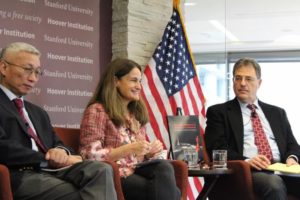
Credit: Hoover Institution
The CCP has developed a “very sophisticated apparatus” for projecting influence, said Claremont McKenna professor Minxin Pei (far left), with various entities assigned specific tasks for targeting media, diaspora, universities, and think tanks, for example. The regime’s “long-standing intent” to project cross-border influence had been limited by scarce resources, but since 2008 its initiatives have become well-funded and aggressive. In universities, it uses five sets of tools or tactics, employing Confucius Institutes, Chinese student associations, grants and gifts, direct pressure and intimidation.
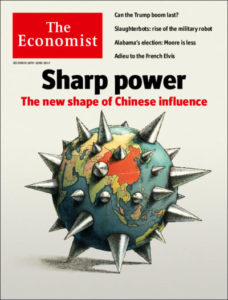 China’s government has established 110 Confucius Institutes on dozens of U.S. campuses, the report notes. The institutes are required to use Communist Party-approved materials “that promote PRC Chinese viewpoints, terminology and simplified characters; the avoidance of discussion on controversial topics such as Tibet, Tiananmen, Xinjiang, the Falun Gong, and human rights in American classrooms and programs.”
China’s government has established 110 Confucius Institutes on dozens of U.S. campuses, the report notes. The institutes are required to use Communist Party-approved materials “that promote PRC Chinese viewpoints, terminology and simplified characters; the avoidance of discussion on controversial topics such as Tibet, Tiananmen, Xinjiang, the Falun Gong, and human rights in American classrooms and programs.”
The authors recommend three principles to guide responses to China’s influence operations – commitments to transparency, integrity in maintaining the independence of American institutions, and reciprocity in pursuit of productive U.S.-China relations.
Beijing targets think tanks as intermediary institutions for influencing media, government and the public in order to promote a “more favorable narrative” on China, the Council on Foreign Relations’ Liz Economy (above, center) told the meeting. It uses funding, access to the Chinese market and visa access as leverage, and tries to enforce PRC norms by, for example, seeking to exclude Taiwan or critical voices from events.
Beijing’s influence operations “not only seek to redefine China’s place in the world as a global player,” but also to promote a “China Option” to the rest of the world as “a more efficient developmental model” just as the Soviet Union projected itself as a viable alternative to Western liberal democracy during the Cold War, the report notes.
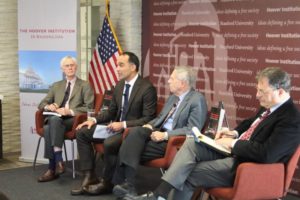
Credit: Hoover Institution
The report is a “microcosm of ominous US-China relations,” which are at the “most serious juncture” since the 1970s’ opening, said Winston Lord, a former US Ambassador to China, citing the more pessimistic mood shift in the US. A “calibrated response not a sledgehammer” approach is required to manage the new strategic competition, which is now systemic rather than episodic.
China has also been aided by the US abdication of leadership and alienation of allies, while US soft power has been “sapped” by a failure to promote democracy, Lord added.
It is important to distinguish influence from interference when addressing China’s media strategy, said the Asia Society’s Orville Schell, who co-chaired the working group that produced the report. China has a “wide spectrum” of options, but it has succeeded in securing the allegiance of most Chinese language media abroad and in proliferating pro-Beijing media outlets abroad, including Francophone media in Africa.
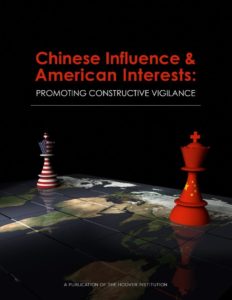 Schell says the report’s authors came to the conclusion “that the relationship between the U.S. and China when it comes to influence is not reciprocal.” “The open society of the United States gets used for Chinese purposes in myriad ways that are not available to Americans in China.”
Schell says the report’s authors came to the conclusion “that the relationship between the U.S. and China when it comes to influence is not reciprocal.” “The open society of the United States gets used for Chinese purposes in myriad ways that are not available to Americans in China.”
“Openness and freedom are fundamental elements of American democracy and intrinsic strengths of the United States and its way of life,” the report concludes. “These values must be protected against corrosive actions by China and other countries.”
“The ambition of Chinese activity in terms of the breadth, depth of investment of financial resources, and intensity requires far greater scrutiny than it has been getting, because China is intervening more resourcefully and forcefully across a wider range of sectors than Russia,” the report found.
Australia had been forced to react to Beijing’s sharp power earlier than most due to its higher trade dependency, larger Chinese student presence and the threat of parties becoming dependent on Beijing-linked funds, said John Garnaut, a former Senior Adviser to Australian PM Turnbull. The best weapons are transparency and sunlight, he told the Hoover forum. Australia restructured security agencies, adopted new criminal laws on election interference and a blanket ban on foreign donations, showing that China can be deterred through “strategic systematic enforcement.” But that requires capability – more people and tools, he added.
 China is unique in the scale and resources it commits to projecting sharp power, confirming that Marxism may be dead but “Leninism is alive and well,” said Stanford’s Larry Diamond, the report’s co-editor. Liberal democracies face a dilemma, “We want to remain an open society,” he said, “but we need reciprocity to get their attention.” Democracies’ focus should be Russia, Iran and the Gulf States too.
China is unique in the scale and resources it commits to projecting sharp power, confirming that Marxism may be dead but “Leninism is alive and well,” said Stanford’s Larry Diamond, the report’s co-editor. Liberal democracies face a dilemma, “We want to remain an open society,” he said, “but we need reciprocity to get their attention.” Democracies’ focus should be Russia, Iran and the Gulf States too.
It’s important not to exaggerate the threat of China’s initiatives in the United States, just as it is important not to demonize Chinese Americans and lurch into a new McCarthyism targeting a 21st-century version of “reds under the bed,” writes John Pomfret, a member of the Working Group on Chinese Influence Activities in the United States and the author of “The Beautiful Country and the Middle Kingdom.” “Nonetheless, as this report acknowledges, sadly in my personal view, the United States and China are at an inflection point in their relationship,” he suggests.” If engagement is failing, what is the alternative? If a clash of civilizations is looming, can it be carried off short of a wider conflict?”
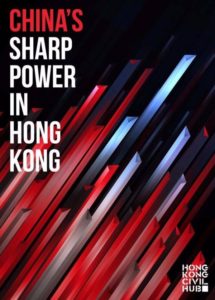 Most noteworthy is the roster of contributors to the report, many of whom have been leading advocates of engagement, The Washington Post adds.
Most noteworthy is the roster of contributors to the report, many of whom have been leading advocates of engagement, The Washington Post adds.
“It’s not as though this is a bunch of hostile, anti-Chinese people,” said Lord, who accompanied Henry Kissinger on his secret 1971 trip to Beijing, which paved the way for China’s opening to the West. “Yet all of us have become more pessimistic about the trends and feel that we’re at a crossroads in the relationship.”
Worrisome
“China has not sought to interfere in a national election in the United States or to sow confusion or inflame polarization in our democratic discourse the way Russia has done,” the report concedes.
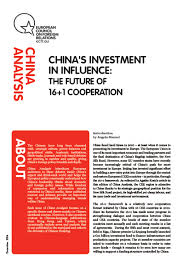 However, it adds, “China’s influence activities have collectively helped throw the crucial relationship between the People’s Republic of China and the United States into a worrisome state of imbalance and antagonism.”
However, it adds, “China’s influence activities have collectively helped throw the crucial relationship between the People’s Republic of China and the United States into a worrisome state of imbalance and antagonism.”
“Not only are the values of China’s authoritarian system anathema to those held by most Americans, but there is also a growing body of evidence that the Chinese Communist Party views the American ideals of freedom of speech, press, assembly, religion, and association as direct challenges to its defense of its own form of one-party rule.”
In a note of dissent, analyst Susan Shirk said the report exaggerated the threats, The WSJ adds.







